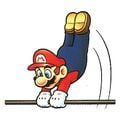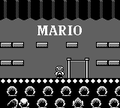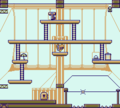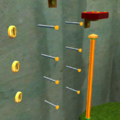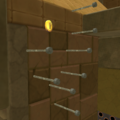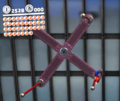Wire: Difference between revisions
Nintendo101 (talk | contribs) (Created new article for wire and bar info. Per proposal.) Tag: Removed redirect |
Nintendo101 (talk | contribs) (→Super Mario Galaxy 2: "localized" is a strong word.) |
||
| Line 27: | Line 27: | ||
====''Super Mario Galaxy 2''==== | ====''Super Mario Galaxy 2''==== | ||
Bars, | Bars, referred to as "nails" in the [[Prima Games]] guidebook,<ref>Browne, Catherine. 2010. ''Super Mario Galaxy 2'' [[Prima Games|Prima]] Premiere Edition guide. Page 220.</ref> return in ''[[Super Mario Galaxy 2]]'', behaving as they did in the previous game. Bars only appear in the [[Clockwork Ruins Galaxy]]. They are used in the [[mission]] "[[Time for Adventure]]", where they must be used to reach the [[Power Star]]. The bars look rusted in this game, matching the aesthetic theming of the Clockwork Ruins Galaxy. | ||
====''Super Mario Odyssey''==== | ====''Super Mario Odyssey''==== | ||
Revision as of 23:38, March 23, 2024
- This article is about taught, metal objects that Mario can only swing from. For the elastic wired cables from Super Mario Sunshine, see rope.
| Wire | |
|---|---|
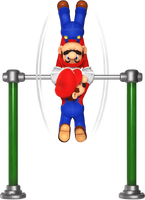 Artwork from Mario vs. Donkey Kong | |
| First appearance | Donkey Kong (Game Boy) (1994) |
| Latest appearance | Mario vs. Donkey Kong (Nintendo Switch) (2024) |
Wires,[1] also referred to as bars,[2][3][4] are metal objects in the Super Mario franchise that the player character can cling to and swing from. The character will automatically grab onto a wire on contact, and moving the control stick up and down (or back and forth, depending on the context) will cause them to swing. Letting go at the apex propels the character high into the air, allowing them to access greater heights and tall platforms they otherwise would not be able to reach. Though inconsistent, the term "wire" is generally reserved for long, taught power cables spanning across opposite walls. They are only present in Donkey Kong and its sequel Mario vs. Donkey Kong. The ones discontinuous with opposing walls are referred to as "bars", and are more recurring. They closely resemble the horizontal bars used in gymnastics.
Wires are similar visually and mechanically to the horizontally strung ropes that appear in other mainline Super Mario games. Bars are comparable to trapezes, which appear alongside them in Super Mario Galaxy and Super Mario Galaxy 2.
History
Donkey Kong franchise
Donkey Kong (Game Boy)
Ropes,[5] also called Horizontal Bars,[6] appear in Donkey Kong for the Game Boy, where they are attached to transmission towers. Mario can grab on and move across ropes and can also do the Wire Spin to either do a small jump or a large jump to get to areas he could not reach. Ropes are either diagonal or horizontal, which can help make Mario ascend heights or traverse gaps. Enemies called Wire Traps sometimes appear along ropes.
The wire ropes from Super Mario Sunshine share some traits and were potentially derived from these ropes, but they are more elastic and can by walked across like tightropes.
Mario vs. Donkey Kong
The objects reappear in Mario vs. Donkey Kong and the Nintendo Switch remake. This time, they are referred to as wires and bars.[7] They behave exactly the same as they did in Donkey Kong.
Super Mario series
Super Mario Galaxy
Bars appear in Super Mario Galaxy, exclusively on the walls of the Deep Dark Galaxy. They are silvery with light-orange ends in this game, and provide a limited range for the player character to jump off. If the character jumps onto a bar with maintained momentum, they will automatically be swung forward, enabling them to immediately be swung forward and reach the apex without needing to tilt the control stick. Bars are clustered together and evenly spaced apart, allowing the player to swing from one to another in rapid succession.
Super Mario Galaxy 2
Bars, referred to as "nails" in the Prima Games guidebook,[8] return in Super Mario Galaxy 2, behaving as they did in the previous game. Bars only appear in the Clockwork Ruins Galaxy. They are used in the mission "Time for Adventure", where they must be used to reach the Power Star. The bars look rusted in this game, matching the aesthetic theming of the Clockwork Ruins Galaxy.
Super Mario Odyssey
In Super Mario Odyssey, bars are red with gray, reflective orbs at the end. They are embedded into the walls of subareas in the Metro Kingdom and Snow Kingdom. In the Wooded Kingdom, there are multiple Timer Challengess where bars briefly appear on the sides of terrain once Mario tosses Cappy at a Scarecrow. In the Hanging from a High-Rise subarea in the Metro Kingdom, bars are attached to a cross-shape apparatus that rotates every few seconds, after which they stop and shake before rotating again. Mario can grab on to these bars and jump from them.
On the streets of New Donk City, the overhanging portion of lamposts[9] function exactly like bars.
Wario Land: Shake It!
Bars appear suspended in the air in Wario Land: Shake It! When clinging to a bar, Wario performs a move called the Bar Spin if the player shakes the ![]() . Pressing
. Pressing ![]() while spinning allows the player to move him to a subsequent bar.
while spinning allows the player to move him to a subsequent bar.
Gallery
Names in other languages
| Language | Name | Meaning | Notes |
|---|---|---|---|
| French | Câble[10] | Cable | |
| German | Stange[16] | Bar | |
| Italian | Parallela[17] | Parallel bar | |
| Spanish | Cable[18] | Cable | |
| Barra[19] | Bar |
See also
Horizontal Bar, a Gymnastics Event from Mario & Sonic at the London 2012 Olympic Games
References
- ^ Mario vs. Donkey Kong instruction booklet, page 25.
- ^ Mario vs. Donkey Kong Nintendo 3DS Virtual Console digital instruction manual, page 12.
- ^ Wario Land: Shake It! instruction booklet, page 4.
- ^ Walsh, Doug, and Joe Epstein (2017). Super Mario Odyssey: PRIMA Official Game Guide. Roseville: Prima Games. Page 99, 102, 105, 107, 145.
- ^ Game Boy Donkey Kong English instruction booklet, page 11.
- ^ "Swing from the Horizontal Bar, then press Up on the Control Pad and the Jump button." - The Super Game Boy Player's Guide, page 36.
- ^ Mario vs. Donkey Kong American English Nintendo 3DS Virtual Console digital manual, tab 12: "Advanced Controls".
- ^ Browne, Catherine. 2010. Super Mario Galaxy 2 Prima Premiere Edition guide. Page 220.
- ^ kikai, Rachel Roberts, and Jenny Blenk, editors. (2017). The Art of Super Mario Odyssey (First English Edition). Milwaukie: Dark Horse Books. Page 176.
- ^ Mario vs. Donkey Kong European instruction booklet, page 58.
- ^ Mario vs. Donkey Kong Shogakukan book
- ^ Mario vs. Donkey Kong Japanese instruction booklet, page 4.
- ^ Nintendo, Co. Ltd. (2004). "Action & Puzzle." Mario vs. Donkey Kong. Retrieved 22 Feb. 2024.
- ^ Sakai, Kazuya (Ambit), kikai, Akinori Sao, Junko Fukuda, Kunio Takayama, and Ko Nakahara (Shogakukan), editors. (2015). 『スーパーマリオブラザーズ百科: 任天堂公式ガイドブック』. Tokyo: Shogakukan (Japanese). Page 136, 170.
- ^ Game Boy Donkey Kong Japanese instruction booklet, page 9.
- ^ Mario vs. Donkey Kong European instruction booklet, page 38.
- ^ Mario vs. Donkey Kong European instruction booklet, page 118.
- ^ Official Mario vs. Donkey Kong website (Guías Nintendo)
- ^ Mario vs. Donkey Kong European instruction booklet, page 98.
| Donkey Kong | |
|---|---|
| Characters | Donkey Kong • Mario • Pauline |
| Levels | 25m • 50m • 75m • 100m |
| Items and objects | Bolt • Conveyor Belt • Hammer • Ladder • Lift • Parasol, Hat & Bag |
| Enemies and obstacles | Barrel • Cement tub • Fire • Fireball • Jack • Oil drum |
| Music | Opening • 25m Theme • Hammer |
| Other | Gallery • Media • Staff |
